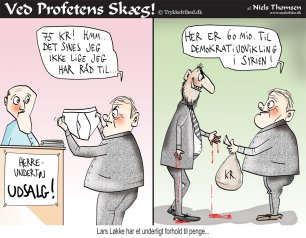"I don't think we can call England a free country anymore" – said Canadian journalist Ezra Levant after the verdict in London's Old Bailey on freedom of speech activist Tommy Robinson on July 5. And that's hardly an overstatement, as Robinson was pronounced guilty and sentenced for "contempt of court", after what might best be called an optical farce where the outcome was given in advance, and otherwise politically motivated to such a degree that it comes perilously close to the actions of the judiciary of England being compared to the actions of 'illiberal states' such as Russia and Turkey. Countries that are often blamed for utilizing a legal system that merges the interests of political power in criminalizing political opponents and troublesome journalists.
Boiled down to a Maggi cube, Tommy Robinson is convicted of an offense where neither police nor prosecutor have actually been able to fulfil the burden of proof, which is why the indictment has also been changed several times: He has now been sentenced to a total of 9 months in prison for a misdemeanor for which no British journalist has received more than a fine for the past 70 years.
“Why on earth should a man be sentenced to prison on the basis of that persons’ political background; it is inconceivable in a country with a rule of law” one would probably say - but the case against Tommy Robinson also has strong ties to the biggest scandal in recent British history, the so-called Grooming scandal, in which a number of heinous rape cases where the Muslim immigrant community targeted underage girls from the English subclass – a scandal that shook the British.
But not only that: The Grooming scandal has also showcased how the police, justice system, social authorities, and mainstream media have made great efforts to silence and to conceal the depth and scope of these sex crimes from the public, and the British authorities' brutal persecution of Tommy Robinson should be seen as an extension in the in continuation of these efforts. Indeed, Robinson's journalism has uncovered societal problems that mainstream media refuse to touch. In this case, that culture has a huge impact on these sex and violence crimes, with 84% of the accused men having a Muslim background.
When the scandal started rolling in earnest a few years ago, Tommy Robinson reported as a citizen journalist from the Northern England courthouses where the rape lawsuits took place.
This earned Tommy Robinson, last May, 13 months in prison for violating the authorities' reporting ban. This was, in itself, a very harsh punishment for what must be termed a minor infraction which, as mentioned, has never brought other journalists more than a fine
But even a disproportionate prison sentence was not enough for the English authorities: Tommy Robinson was deliberately transferred to a Muslim dominated prison, where he had to spend over 10 weeks in solitary confinement, as his Muslim prisoners would otherwise kill him. It was also Muslim prisoners who prepared his food, so he did not dare to eat it, but lived on 7 apples and 5 cans of tuna a week, thereby losing 20 kg during his imprisonment. The extremely stressful conditions - of which the British authorities were fully aware, and had even staged - were further aggravated by the fact that Tommy Robinson's cell was on the ground floor right next to the prison yard where the Muslim prisoners passed by when they were going to prayer. Robinson was therefore forced to have his window closed in the middle of the heatwave, as otherwise, people would spit or throw excrement through the window.
In August 2018, Robinson was released because the legal process had been riddled with legal errors, but the English state attorney resumed the case, which has left many observers perplexed:
Firstly, people find it curious that the prosecutor in England is taking up a banal case of an alleged journalist's alleged breach of a press ban in a rape case to a higher court such as Old Bailey. The English Attorney General does serve the interests of government and political power in a problematic gray zone between the executive and the judiciary, but he does not usually deal with cases such as Robinson's. This gives nourishment to the suspicion that Robinson is being punished more for who he is rather than for what he has actually done.
Secondly, it is remarkable that the case against Robinson was concluded without any jury - even though it is not a criminal case, it is nonetheless a case that triggers imprisonment.
Thirdly, the authorities' changing charges, and changes to the indictment have been astonishing: Robinson was first arrested on the grounds that he had have "disturbed the public peace." It was then changed to "contempt of court" and recently, the authorities have added a new indictment where, as something new, it is criminal to exhibit subjective negligence, and expose accused rape offenders to so-called "aggressive confrontation".
What, then, is Tommy Robinson's crime? What constitutes his criminal act, which has so far given him 3 months in solitary confinement, and which has now added another 6 months to his sentence?
Anyone can see what his crime is by searching the web and seeing it with their own eyes: He was standing outside the Leeds courthouse and asked the following questions to the two rapists in one of the grooming cases: "How do you feel about the verdict? "And" Do you feel any guilt? "
A frightening punishment, and no less frightening because of the fact that he only used information in his reporting that had already been published. The information he shared about the defendants actually came from the BBC website. And, under English law, a court cannot punish anyone for passing on information that is already in the public domain.
There is much to indicate that this is exactly what the English legal system has done anyway. This despite the fact that Robinson repeatedly approached police and law enforcement to make sure he did not break any rules and did not violate a ban on reporting on the case. Tommy Robinson is therefore convicted - not just because he "filmed in front of the court", as other English journalists regularly do, but because, in the judge's opinion, he exhibited so-called "subjective negligence" and because he filmed the defendants in a wrong and "aggressive" way.
Gerard Batten, leader of the UKIP party, recently called the court decision "… This is a travesty of justice. A political verdict on trumped up charges…". It is difficult to perceive it differently. With the verdict and sentencing on Tommy Robinson, the political power in England has abused the justice and prison system to silence a troublesome Islamist critic, and they have done so with the help and applause of the mainstream press who would otherwise have rushed to his defense and called him a political prisoner if he had been a journalist from China or Turkey.
It is indeed a black day for freedom of expression and the rule of law in England.



